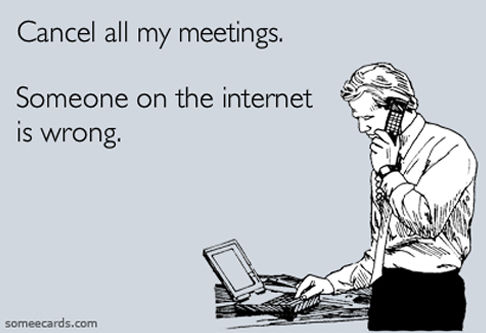I am an expert at arguing.
I have started or participated in internet arguments against worship leaders and pastors of churches that I have attended, debated media with a writer for MTVNews and “The Nightly Show,” helped write a thirty-point takedown of a post from a “Hamilton” fandom blogger, and helped start an argument with a producer and a writer on an extremely popular Cartoon Network show. I’ve written thousands of words for this paper alone in opinions pieces, including a 1,700 word piece about the protests on the University of Missouri campus earlier this year. I write poetry about racism, sexism, gender, and standardized American Christianity. During high school, I argued with my entire classroom for nearly fifteen minutes about reverse racism. In middle school, I made a classmate cry by saying that the American flag was “just fabric.”
Of course, if you looked at my Facebook feed today, you’d find me discussing such controversial topics as “maybe the boys were the friends that we made come back to town along the way” and saying that East Coast apples are great and all but “I’ll stick with fuji apples the size of a large man’s fist.” And while my Twitter page @radarsignals goes into more political topics, I am less likely to be tweeting about systemic racism than I am tweeting about how the “Higglytown Heroes” theme song is one of the greatest theme songs of all time.
After years of arguing on the internet, I’ve discovered the secret to how to argue and also live a happy and fulfilling life: most arguments on the internet are pointless. Arguments only work well when both parties are willing to listen to each other and exchange ideas. On the internet, the people that you are arguing with seldom care about anything other than proving that they are right and you are wrong. People who genuinely care about the issues at hand will do research outside of a meme that somebody posted on Facebook.
There are, of course, potential positive sides to arguments online. They can be used to teach the people observing the argument but are not arguing against you. There are also rare cases where a person genuinely has their mind changed through an argument online. Cases like these seldom happen but usually come through respectful dialogue between both sides that does not fit the paradigm of stereotypical internet fights. I’ve been most successful at communicating when I’m spending less time trying to prove that I’m right and more time trying to have the person that I’m arguing with understand my point of view.
It’s also important to pick your battles. While I could potentially argue with every single thing that I don’t agree with online, that would be an emotionally taxing experience that I am not at all obligated to participate in. Instead of arguing with a white youth pastor about why the “what about Black on Black crime” graphic posted by the leader of the white supremacist group “alt-right” is racist and misleading, I could be making more tweets about the inherent greatness of the “Higglytown Heroes” theme song. And why would I waste my time raising my blood pressure about racism when I could be listening to the “Higglytown Heroes” theme song?
It is really, really good.





















































